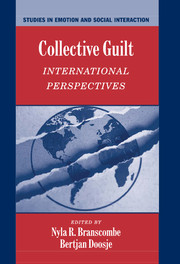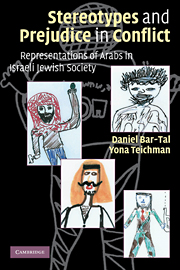Collective Guilt
Emotion can result from interpreting group actions as reflecting on the self due to an association between the two. This volume considers the nature of collective guilt, the antecedent conditions necessary for it to be experienced, how it can be measured, as well as how collective guilt differs from other group based emotions. Research from Australia, Canada, Germany, Israel, the Netherlands, Northern Ireland, and the USA addresses critical questions concerning the who, when, and why of the experience of collective guilt. The political implications of collective guilt and forgiveness for the past are considered, and how those might depend on the national context. How collective guilt can be harnessed and used to create a more peaceful future for groups with a history of violence between then is emphasized.
- International authors and research representation
- All original research presented
- Topic of importance for major intergroup and international conflicts; points to conflict resolution and world peace
Reviews & endorsements
"A decade or more ago, as researchers first recognized the key role of emotions in the ways groups deal with eaach other, the focus was naturally on emotions most obviously related to intergroup conflict, such as anger or fear. Now the conceptual focus has broadened to include a wider range of group-based emotions. Collective guilt is particularly interesting, because it can lead to prosocial behaviors (such as apologies or restitution to injured groups), but also can motivate people to turn a blind eye to their own groups's past misdeeds. This volume preseents research taking a variety of perspectives on collective guilt, addressing important issues in multiple national and historical contexts." Elliot R. Smith, Indiana University
Product details
September 2004Hardback
9780521817608
356 pages
229 × 152 × 24 mm
0.69kg
24 b/w illus. 11 tables
Available
Table of Contents
- Part I. Defining the Nature of Collective Guilt:
- 1. International perspectives on the experience of collective guilt Nyla R. Branscombe and Bertjan Doosje
- 2. The measurement of collective guilt: what it is and what it is not Nyla R. Branscombe, Ben Slugoski and Diane M. Kappen
- 3. The evocation of moral emotions in intergroup contexts: the distinction between collective guilt and collective shame Brian Lickel, Toni Schmader and Marchelle Barquissau
- 4. Collective guilt in the United States: predicting support for social policies that alleviate social injustice Robyn Mallet and Janet Swim
- 5. Gender inequality and the intensity of men's collective guilt Michael T. Schmitt, Nyla R. Branscombe and Jack W. Brehm
- Part II. The Relationship between Group Identification and Collective Guilt:
- 6. Consequences of national in-group identification for responses to immoral historical events Bertjan Doosje, Nyla R. Branscombe, Russell Spears and Antony S. R. Manstead
- 7. Refining the meaning of the 'collective' in collective guilt: harm, guilt, and apology in Australia Craig McGarty and Ana-Maria Bliuc
- 8. Who feels guilty? Collective guilt, moral outrage, exonerating cognitions, group identification and personal values among Jewish-Israelis Sonia Roccas, Yechiel Klar and Ido Liviatan
- 9. It depends on your point of view: implications of perspective taking and national identification for Dutch collective guilt Sven Zebel, Bertjan Doosje and Russel Spears
- 10. Collective guilt, national identity, and political processes in Germany Lars Rensmann
- Part III. Consequences for Intergroup Relations:
- 11. Intergroup forgiveness and guilt in Northern Ireland: social psychological dimensions of 'The Troubles' Miles Hewstone, Ed Cairns, Alverto Voci, Frances McLernon, Ulrike Niens and Masi Noor
- 12. Intergroup reconciliation processes in Israel: theoretical analysis and empirical findings Arie Nadler and Ido Liviatan
- 13. On whether to apologise to indigenous Australians: the denial of white guilt Martha Augoustinos and Amanda LeCouteur
- 14. Racial wrongs and restitutions: the role of guilt and other group based emotions Aarti Iyer, Colin W. Leach and Anne Pedersen
- 15. Importance of social categorization for forgiveness and collective guilt assignment for the Holocaust Michael J. A. Wohl and Nyla R. Branscombe
- 16. Individual versus group rights in Western philosophy and the law Elazar Barkan
- 17. A social psychological process perspective on collective guilt Nyla R. Branscombe.








